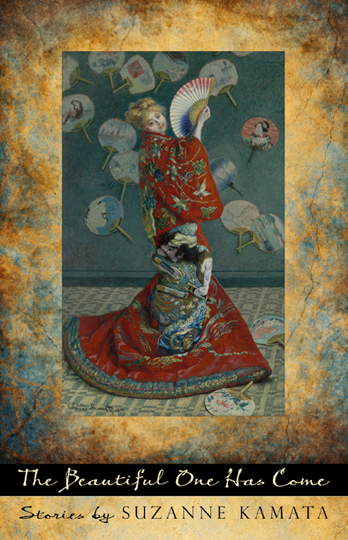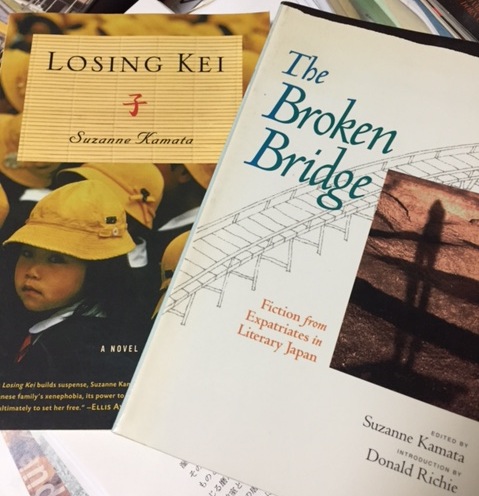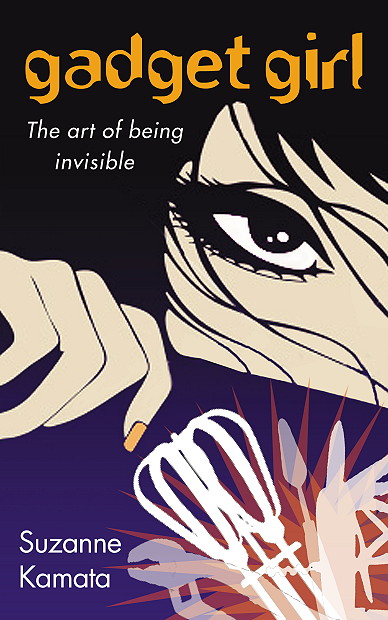April 3, 2016
Interview: Suzanne Kamata
On Writing, and Promoting, Diverse Books
Suzanne Kamata has become a respected author for teens and adults, probing issues of physical ableness and cultural identity. An experienced anthologist, she has also edited short fiction about Japan, as well as nonfiction about multicultural motherhood and raising children with special needs. She lives in a farming community in Shikoku. In this interview for SWET, Kamata describes her published writing and some of her experiences promoting her works. She also previews her current projects.
You’re an acclaimed author, an American living in Japan, and a mother. You have won several awards. What kind of books do you write (or edit) and what awards have they won?
The overall theme of my books to date is diversity. My books tend to be about multicultural and/or differently abled families and/or individuals. Over the past several years while I have been raising my children, motherhood—or parenthood—has been a big concern. And of course since I have lived in Japan for the past 27 years or so, Japan often figures in somehow.
.jpg) My anthology Call Me Okaasan: Adventures in Multicultural Mothering and my short story collection The Beautiful One Has Come received a number of awards for small press and independently published books. More recently, my young adult novel Gadget Girl: The Art of Being Invisible was named a YA Honor Book by the Asian/Pacific American Librarians Association, and a book of Outstanding Merit, as well as one of the Best Books of the Year, by the Bank Street College. I’m quite proud of those honors. I’m also proud that my most recently published novel Screaming Divas was named to the American Librarians Association’s Rainbow List.
My anthology Call Me Okaasan: Adventures in Multicultural Mothering and my short story collection The Beautiful One Has Come received a number of awards for small press and independently published books. More recently, my young adult novel Gadget Girl: The Art of Being Invisible was named a YA Honor Book by the Asian/Pacific American Librarians Association, and a book of Outstanding Merit, as well as one of the Best Books of the Year, by the Bank Street College. I’m quite proud of those honors. I’m also proud that my most recently published novel Screaming Divas was named to the American Librarians Association’s Rainbow List.
To illustrate the themes you have described in your books, would you please introduce us to some prominent characters in your award-winning titles?
I am interested in promoting diversity, because my family is very diverse. Aiko Cassidy, the main character in Gadget Girl and also in my work-in-progress Indigo Girl, is biracial and has cerebral palsy. The stories in The Beautiful One Has Come are about expatriates of various nationalities in various countries, reflecting my own experiences and those of people I have come across. Screaming Divas is set in the United States, which is, of course, a very diverse country. Harumi, one of four main characters, is Japanese-American, and Esther is a lesbian. I knew many different kinds of people, including Asian-Americans and gay individuals, whose stories are rarely represented in mainstream fiction.
I am interested in what kind of anxieties or aspirations you have as an author.
These days there is a lot of pressure on authors to market their books. A long time ago, writers were just expected to write. Now, I feel personally responsible and somewhat ashamed if a book of mine is not selling well. I feel as if I’ve let my editor and publisher down, even if they haven’t really done anything themselves to promote the book.
 I aspire to have my books more widely distributed and to have more readers. It’s hard when my readers are in English-speaking countries and I am in rural Japan, but the Internet makes it slightly easier.
I aspire to have my books more widely distributed and to have more readers. It’s hard when my readers are in English-speaking countries and I am in rural Japan, but the Internet makes it slightly easier.
Of course I’m also anxious about finding publishers for the books I’m working on now; deadlines; and bad reviews. And the time I spend away from home promoting my books places a burden on my family. So yes, I have lots of writing-related anxiety!
It wouldn’t be fair to ask only about anxieties. How about things you are grateful for? It must be a good feeling to be properly published and have your writing recognized, with the opportunity to build a reputation as more people gain exposure to your writing.
Yes, I am grateful that my work has been published and read. I appreciate every editor, publisher, book designer, and illustrator I have worked with. I’m always happy to hear that my work has helped someone in some way, or entertained, or educated. And I am grateful to have been paid for my work.
You have mentioned various business aspects of being an author. Do you have any tips to share that you’ve learned along the way?
These days it seems important to have an Internet presence, especially for those of us writing in English but living in rural Japan! Things are always changing, though. My biggest tip would be to not view other writers as competition, but as potential allies. Group efforts often yield all kinds of rewards.
I see that you’re active especially on Twitter. (https://twitter.com/shikokusue?lang=en&lang=en) What’s your take on social media and its uses for an author?
I don’t think that social media necessarily helps with book sales, but it is an easy way to let friends and family know about new publications, and it is a fun way to interact with other authors. I did manage to get coverage for one of my books on MTV.com after replying to a query for music-related books on Twitter. I also contributed a quote to an article published in a nationally distributed American magazine, which mentioned my book Screaming Divas, after replying to another query on Facebook. Once in a while opportunities like that come up.
Also, it looks as if you have to continue finding new publishers—you’ve gone from Wyatt-MacKenzie, to Leapfrog Press, GemmaMedia, Merit Press, and others. So a publisher does not always turn out to be eager to release your next book?

How about the process of writing and how you organize your time? Do you set an amount of time to write every morning or something like that? Is writing difficult at times and do you have to push yourself, or do you find writing invigorating and always look forward to it, like the ideas themselves are urging you to write?
I try to set aside one day a week just for writing. I always have the urge to write, and I become irritated when I cannot write, but right now I have a full-time university teaching position.
At the moment, I have completed drafts of four different projects. To motivate myself, I set up word count goals, such as 2,500 words per week. I am now on various deadlines to revise the different projects, so I am motivated by that. Revision is easier than writing, and can be fit into an hour here, an hour there—but I miss the writing of fresh material. When these books are ready to submit, I will probably go back to setting weekly or monthly word count goals to produce new writing.
Living immersed in another culture as you do, you must find time to read English works as well. Any recent authors or titles that you found of particular inspiration?
Recently I’ve been reading the works of Gamel Woolsey, who was an expatriate in Spain for a while. She wrote a nonfiction book called Death’s Other Kingdom that was published in 1939, as well as two novels that were published well after her death but are surprisingly modern. She was a wonderful writer, but she never found the kind of success that she dreamed of having in her life. What I’m learning from her is that it’s important to just do the work. As writers, we don’t always have control of how our writing will be received. We might even be writing for another era.
Ah, but you asked about recent authors and titles! I loved Leza Lowitz’s novel-in-verse Up From the Sea, which deals very sensitively with the March 11, 2011 disasters; The Colony, by Jillian Weise, which presents a whole new way of writing about disability; Ashley Warlick’s elegant The Arrangement, which imagines the life of food writer M. F. K. Fisher; and The Trip to Echo Springs by Olivia Laing, a discursive travel memoir on writers and drinking. All of these are related in one way or another to my current writing projects.

One of the four projects is a novella-length nonfiction travel book for literacy learners entitled A Girls’ Guide to Islands, about visiting the islands of the Inland Sea with my disabled daughter. A second project is Indigo Girl, a sequel to my YA novel Gadget Girl, in which the main character, Aiko, comes to post-disaster Japan to get to know her biological father better. Home Base is a mid-grade novel featuring Japanese baseball. I have also begun an untitled mother-daughter travel memoir about visiting Paris and other places. I also have a couple of adult novels in the works, but it is too early to talk about them!
Could you say something about the personal rewards or growth to be gained from writing?
I sometimes think that if I had stuck to one genre, for instance, adult novels, I would be more successful, but I have wide-ranging interests and I keep wanting to try new things, such as poetry and food writing! The most rewarding thing about writing is that it allows one to dabble in many different worlds, and to live many different lives. I’ve learned so much! Writing never ceases to be a challenge for me. It never ceases to be a pleasure. When I find myself getting frustrated with the business aspects of, say, young adult writing, I usually turn to something else, like travel writing. I can’t imagine ever being sick of writing.
Thank you for responding to this interview.
